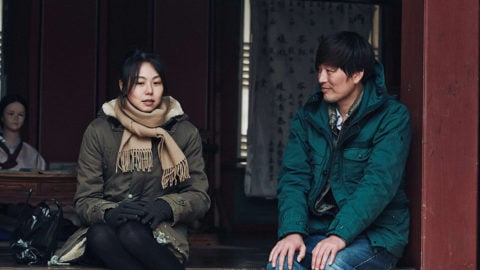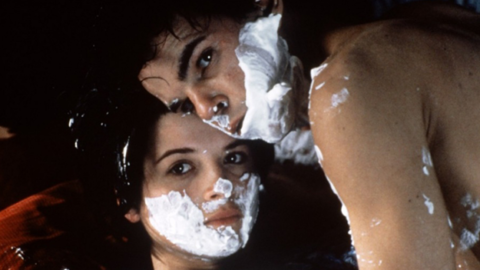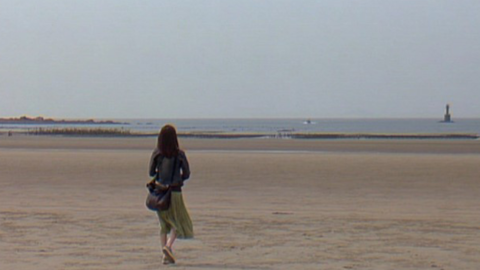Film of the Week: On the Beach at Night Alone
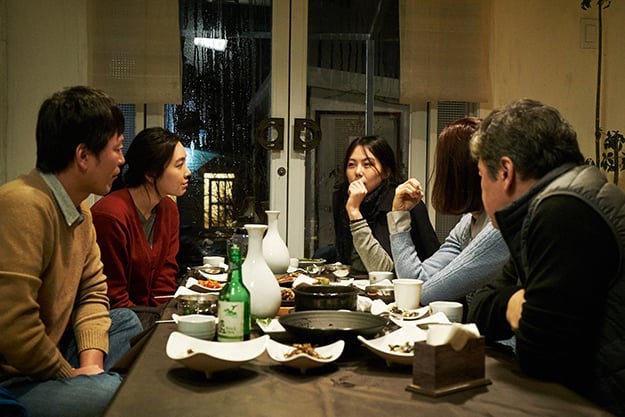
In the final scene of Hong Sangsoo’s On the Beach at Night Alone, a woman gets confrontational with her older ex-lover, a film director. “Are you tormented?” she shrieks at him, shortly after he’s burst into tears. Do the other people at the table—members of his film crew—know what’s going on? Can they read the meaning of the exquisitely painful emotional currents crackling around the table?
Watching this scene, it occurred to me how much Hong’s films—in which drunken, soju-fueled get-togethers around bar and restaurant tables have an almost ritualistic, revelatory status—are not only about the central characters but also very much about the other people at the table who look on in embarrassed bewilderment when this sort of emotional agitation erupts. There’s an earlier moment in On the Beach at Night Alone in which heroine Younghee (Kim Min-hee), having cheerfully overshared about her sex life, begins kissing a female friend. This causes a couple at the table, a man and a woman, to start kissing—which in turn prompts the other member of the party, a single man, to mutter, “I’m feeling left out.” At which Younghee triumphantly announces, “I’m having fun!”
The figure of the excluded man in a way represents the viewer of Hong Sangsoo’s films, who might often feel left out, uncomfortable, or baffled as to what’s going on between the people on screen. As simple and in some ways as straightforward as Hong’s films are, he’s a director profoundly committed to leaving things unsaid, leaving us to figure them out for ourselves. For example, it’s only an hour and 20 minutes into the film that we’re told categorically that Younghee is an actress, although, on the evidence provided, we have possibly guessed this already.
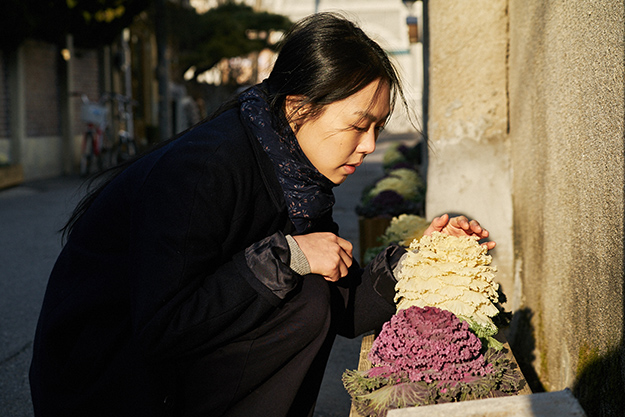
But there are further extra-textual dimensions at work in On the Beach at Night Alone. I wonder whether Kim Min-hee would come across as quite so mercurial and troubling here if we hadn’t previously seen her as the protean, infinitely deceptive ingénue fatale in Park Chan-wook’s The Handmaiden. I suspect she would, but that past knowledge certainly adds a layer of meaning to her performance. More immediately pertinent, it also adds further resonance to know that Kim Min-hee and Hong Sangsoo were themselves having an affair, which they eventually announced publicly (since On the Beach at Night Alone, she has appeared in two more of his films, The Day After and Claire’s Camera).
It’s perhaps this real-life back story—whether the viewer is aware of it or not—that contributes an emotional intensity not always foremost in Hong’s films, which tend to be somewhat coolly detached moral comedies. Kim herself, on screen practically throughout, charges the film from start to finish with a magnetic intensity, whether she’s in full-blown soju-fury mode or more introspectively melancholic. The film comes in two parts—Hong often segments his films into self-contained units—and you might even choose to see it as two films (each chapter comes with its own opening credits). Part one is set in Hamburg, where Younghee is spending some time after abandoning her usual work and parting ways with the man she’s been involved with: she’s missing him, and wondering if he’s thinking about her and whether he’ll come and join her, as planned, in a few days. Little of obvious significance happens at the start: Younghee hangs out with an older friend, Jeeyoung (Seo Younghwa), who has moved to Europe after her divorce. They walk around a street market and a park, chat about their love lives or lack of them—Jeeyoung says she has no more desire, Younghee says that she’s played around in her time and encourages her friend to get out there and do the same. They visit a composer (Karl Feder) who runs a bookshop, then have dinner with a couple (art curator Bettina Steinbrügge, critic and programmer Mark Peranson), with Younghee discreetly offering a couple of bitchy side remarks about the couple. Then something weird and unexplained happens. When the group visits a nearby beach, the camera pans away across the sand in search of Younghee—to find her being carried away on the shoulders of an unidentified man who had earlier approached her in the park to ask the time.
This is the end of part one—but the mystery man will turn up again later in even odder circumstances. Back in South Korea, in the coastal town of Gangneung, Younghee inspects a hotel-style apartment with a group of friends. They walk in and there is the man standing outside on the balcony, cleaning the window—or rather, doing a sort of comic window-cleaning dance, since he doesn’t seem to have come equipped for the job. And nobody seems to see him. He’s an alien presence, an absurd foreign body, as obtrusively visible-invisible as the anamorphically stretched skull draped across Holbein’s painting The Ambassadors. The mystery man seems to play some symbolic role in Younghee’s life—he might be, say, the figure of the desire that she resists but ultimately can’t help yielding to. But at the same time, he’s a device to undercut, even sabotage, this story’s surface realism—just as the ostensible realism of Hong’s previous film Yourself and Yours (2016) teetered precariously on the fact that its heroine is replaced at one point by a supposed doppelgänger.
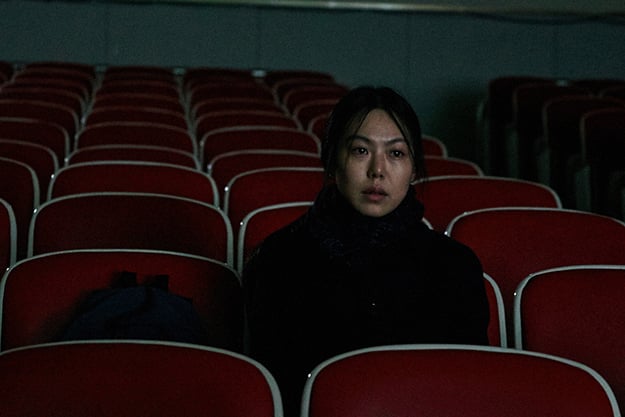
The film’s second part, which begins with Younghee sitting alone and forlorn in a cinema, contains more than one such enigmatic lacuna. Emerging from the cinema, in Gangneung, Younghee meets an older man, a film programmer, whom she initially doesn’t recognize. He tells her some information about mutual friends in the town, facts she seems to have forgotten—as she’s initially forgotten that she has already visited the town some time ago. It’s one way of reminding us that we’re in a fiction—and perhaps a hint that Younghee is an actor, since it’s characteristic of the profession to cast away a role once it’s over, and presumably all the temporary experience that goes with it.
It’s in this second part that Hong’s characteristic comedy of embarrassment comes to the fore. Taken by her friend to a café, Younghee meets another male friend, Myung-soo (Jeong Jae-yeung), who walks in clownishly shivering from the cold. Is he another ex? He well might be, given his evident discomfort in her presence. His discomfort only increases when he’s suddenly confronted by the woman behind the café counter— whose presence has only been revealed once before, in a brief, very Hongian surprise track across the room—who insistently and angrily wants him to sort beans for roasting, right now and regardless of having an attractive guest at the table.
Later in the film, Younghee lies down on a beach only to be woken by a man who’s passing. Would you believe it, he’s a member of a film crew—the AD to the very director who was Younghee’s lover. Before long, Younghee is sitting down to another soju evening with her ex, Sangwon (Moon Seung-kun), and his crew members. Things get painful for the ex-lovers and for everyone else—not least when Younghee tells the older Sangwon, “You’re like a grandfather all of a sudden.” She also makes a comment that’s acquired a new painful piquancy following the Weinstein–Toback–et-al. revelations: “Why so many pretty women around you?” she asks him. The filmmaker semi-squirms defensively (or maybe the squirm just more looks more apparent at this end of 2017): “I love working with pretty people.” Well indeed, and thus it ever was.
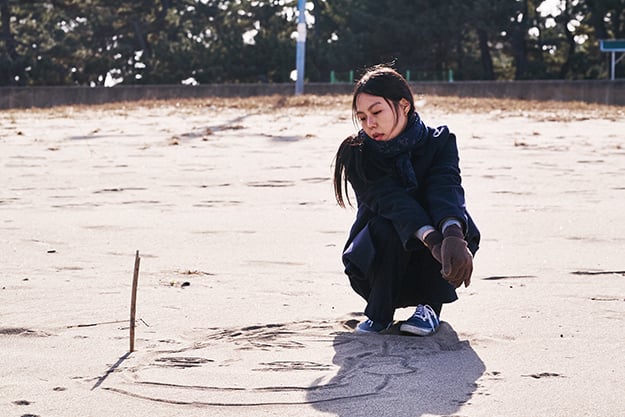
Here, and in the film’s other big dinner table setpiece, Younghee seems determined to live up to her declaration, perhaps more proud than guilty, “I’m a bomb … I’m destructive.” At one point, Sangwon reads out a passage from a novel that’s inspired him to make a film about a painful love affair of his, sparking her jibe about him trying to lessen his torment. Eventually, the director breaks down in tears—and, in one of Hong’s trademark zooms, this time in reverse, he pulls back to show Younghee looking magnificently, disdainfully bored.
At least, that’s how I read her expression, but it’s hard to tell. The brilliance of Kim’s performance is that she’s so hard to read throughout, not because she conceals emotion but because her face, rounded and impish, seems to convey so many things at once: in these table-talk scenes, where she’s seen largely in profile, her face can suggest at once tenderness, amusement, and outright contempt, or perhaps all at once. It would be wonderful to see Min play out-and-out comedy, but what she gives here is something much more nuanced and shifting, a portrait of a woman whose energies are constantly mobilized to fight her pain, and constantly restraining herself from going on the attack against everyone around her. It’s often said that people find it hard to distinguish Hong’s films from one another except in their finer details and their individual structural peculiarities, but this one very much stands alone in its melancholic tone, the sense of carrying the weight of emotional bruising. Sangwon’s breakdown at the table, and his skewering by Younghee, suggest a painful, almost Bergman-esque confessional motivation on Hong’s part, giving the film a bleak sobriety that’s unusual for this director (it’s heightened beautifully by the intermittent use of Schubert’s String Quintet in C Major).
This is also, in the emotional depth that Kim brings to her depiction of Younghee, one of this year’s most fully rounded pictures of a complex female personality, sexually and emotionally aware of who she is, and seeing her struggles through for better or worse. Along with the French discovery of Cannes 2017, Léonor Serraille’s Jeune Femme—albeit nowhere near as joyously—it’s one of the year’s great woman-on-the-edge-of-a-nervous-breakdown movie.
On the Beach at Night Alone is currently showing at the Film Society of Lincoln Center.
Jonathan Romney is a contributing editor to Film Comment and writes its Film of the Week column. He is a member of the London Film Critics Circle.



